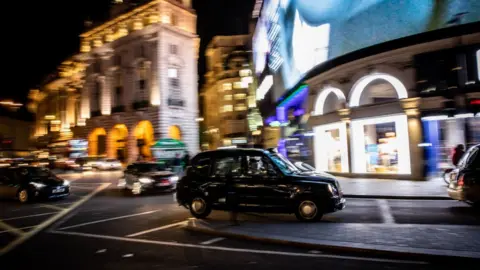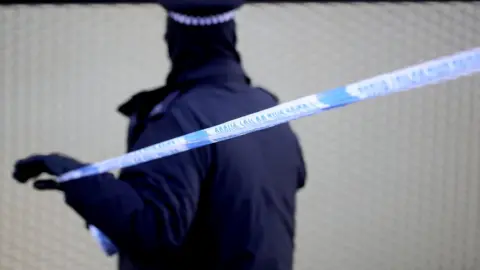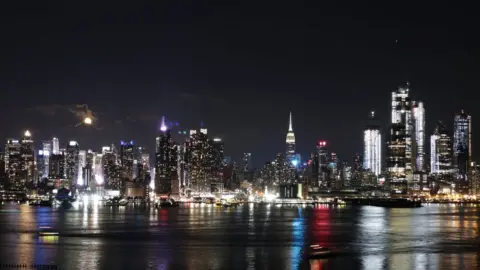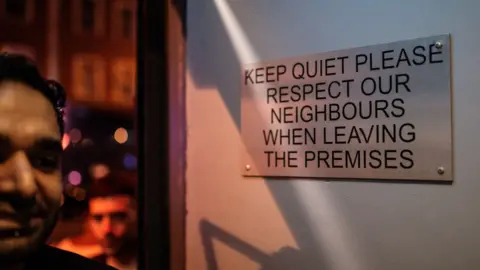The growing importance of the night-time economy
 Getty Images
Getty ImagesIt is 04:00 in central London's clubbing district, Soho. People are slowly streaming out of the clubs, some huddled in doorways waiting for taxis, others dancing on the kerb, merry and very loud.
The night-time economy is a growing part of the UK economy. Nationally, it is the UK's fifth-biggest industry, accounting for at least 8% of the UK's employment and annual revenues of £66bn, according to the Night Time Industries Association.
In fact, the growth of that business activity at night-time prompted London's mayor to call upon the talents of TV presenter and performer Amy Lamé. She has been London's first "night czar" since 2016, and is in charge of the city between 18:00 and 06:00.
"My role encompasses looking after the welfare and wellbeing of the 1.6 million people that are usually working in London. My biggest concern is the 190,000 that work for the National Health Service here in London every night," she says.
 Amy Lame
Amy Lame"Then there's the 150,000 people who are working in professional services - that can involve anything from cleaning, to working for banks and financial services across the globe.
"Third on the list in terms of numbers, are people that traditionally work in the night-time economy. So, bars, pubs and clubs, entertainment. Our economy during the day is growing 2% - while the economy at night is growing 2.2%," says Ms Lamé.
Her team at the Greater London Assembly has conducted what they say is the most comprehensive research in the world in any capital regarding their night-time industry. They've now identified exactly what they think is the next big thing to plough money in to.
"We're ensuring that London's grassroots live music venues are able to not just survive, but thrive. How much does Adele or Ed Sheeran bring to our economy? It's massive. Where did they start? Grassroots live music venues - and that is where the investment is," she says.
 Getty Images
Getty ImagesBut not everybody agrees with the virtues of 24/7 business.
Tony Keith Jones owns two newsagents in the centre of Coventry in the post-industrial Midlands. He says local authorities are wrongly ignoring the biggest night-time concern of a small business like his - higher crime levels.
"We have massive, massive stealing problems at night-time," he says. "The criminals like nicking off all the retailers in the city centre, and they get no punishment apart from a slap on the wrist. Unless you've been caught millions of times - police don't do anything about it."
Statistically, some types of crimes do occur more frequently at night. A report by the London Assembly's police and crime committee back in 2016 found that "alcohol features in a higher proportion of crimes in London that occur at night than during the day", and that "areas with the most night-time violence with injury offences, tend to be those with a strong night-time economy".
 Getty Images
Getty ImagesIn the US, New York - the city that never sleeps - has appointed its own night-time mayor. Since 2018 Ariel Palitz has officially been the senior executive director of the Office of Nightlife at NYC.
She comes from a night-time entertainment background, and Ms Palitz agrees about the challenges faced by night-time businesses. "I owned a nightclub in New York myself for 10 years. So I can tell you from personal experience - if it was easy, everyone would do it," she says.
"The night-time economy in New York generates $35.1bn (£27bn) in economic activity, and nearly $700m in local tax revenue. The NYPD [the police department in New York] has come up with a new philosophy - implementing the mediation approach, rather than summons and enforcement techniques."
Yet as with any economy, there are some questions about how this new economy is being built - and importantly who gets paid and who doesn't.
 Jenan Younis
Jenan Younis"Night-time venues make a lot of money from unpaid labour, like mine," says Jenan Younis, a colorectal surgeon by day, and an unpaid comedienne by night. She performs at some of London's most famous comedy venues.
"There must be something dark about my psyche, but I've always been a night-time worker. An entire industry like mine has burgeoned on unpaid labour - and we exist in the shadows.
"Venue owners might be getting more and more money pumped in to them by local authority schemes - but is any of it going to give organic growth in the long run? How much of this is going back to the actual generators of this value? None," she argues.
Yet underlying this is a long-term shift within the night-time economy, the fact some parts of the sector are in decline. Many cultural venues are rapidly disappearing. Across the UK, 44% of nightclubs shut between 2005-2015, and 25% of pubs closed from 2001-2016, says the Royal Town Planning Institute (RTPI).
 Getty Images
Getty ImagesAlex Green from market research group IBS World gathers statistics from across the world, and says that in the UK nightclubs have been in decline for the past five years: "This is being caused by changing consumer preferences, patterns of drinking, police response, as well as social pressures, noise complaints and anti-social behaviour."
Anecdotally, that makes sense. Back in Soho in the early morning, my fellow post-clubbers aren't showing themselves in the numbers I used to see a decade ago - perhaps I'm part of a cohort of disappearing hardcore night clubbers.
